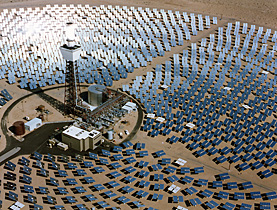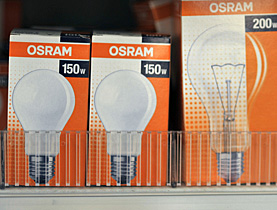Award puts solar scientist in the spotlight

While children might try to start a fire using sunshine and a magnifying glass, scientists are looking into more rational ways of concentrating and storing solar power.
Swiss professor Aldo Steinfeld has been especially inventive. The American Society of Mechanical Engineers (ASME) recently honoured his work by presenting him with the biannual Yellott Award.
Steinfeld is the head of the Solar Technology Laboratory at the Paul Scherrer Institute in Villigen as well as professor of renewable energy carriers at the Federal Institute of Technology, Zurich (ETH). In particular, Steinfeld is known for turning sunlight into fuel – with the aid of some high-tech equipment.
Every two years, the Yellott Award goes to an individual who has made significant contributions to solar engineering.
“Dr Steinfeld is one of the world’s leading experts in the emerging field of solar thermochemical processes, which are very likely to be an important path to achieve energy security and reduce greenhouse emissions,” commented Vince Dilworth, senior programme manager at ASME.
Rainy day savings
Despite its growing popularity, solar energy does have some disadvantages. Its successful collection depends on the weather, and it is difficult to store. But Steinfeld and his team are working to improve the situation.
“The solar technology we are developing allows for the long-term storage and long-range transport of solar energy in the form of chemical fuels, to meet customer’s energy demands whenever and wherever needed,” Steinfeld told swissinfo.ch.
One way of generating fuel is by harnessing and increasing the heat of the sun’s rays in order to trigger chemical reactions. For example, water can be split into hydrogen and oxygen, which can then function as energy carriers in a fuel cell.
“By concentrating solar radiation and capturing it in appropriate solar receivers, it is possible to deliver thermal energy at high temperatures to drive endothermic processes, which in turn implies higher efficiencies for the conversion of solar energy into electricity and fuels,” Steinfeld said.
He and his team also work with a special furnace that can reach up to 2,000°C as it maximizes the power of the sun.
To the layperson it may sound revolutionary, but Steinfeld is one of the first to point out that it isn’t.
“This concept is not new; it was proposed in the early 1960s. But only recently has it been pursued actively by various top research laboratories around the world,” notes Steinfeld.
Bright future
Switzerland may not be the sunniest place on Earth, but it can still benefit from Steinfeld’s research. Indeed, it should be possible to import solar power from sunnier places in the world.
“The technology for solar thermal electricity generation (trough, tower, and dish systems) is technically feasible. There are large areas in southern Europe that have high solar irradiation and could potentially be used for large-scale solar power generation,” said Steinfeld.
In his daily life, Steinfeld says he tries to be environmentally conscious, for example, by taking public transport to work. Meanwhile, he predicts that the vehicles of the future will run on new forms of power.
“Cars and airplanes will be fueled with synthetic liquid fuels produced with solar energy,” said Steinfeld. He also believes that by 2020, concentrating solar power (CSP) plants worldwide will have reached a capacity exceeding ten gigawatts.
For someone whose work revolves around the sun, one might expect Steinfeld to have trouble with grey weather. Not so. His initial reaction on a rainy morning?
“My first thought is that I should take an umbrella to work!”
Susan Vogel-Misicka, swissinfo.ch
The award ceremony and lecture took place during the ASME Energy Sustainability Conference in San Francisco in July.
This award represents an important international recognition for contributions to solar engineering through high quality research and education.
In addition to his other roles, Steinfeld edits the Journal of Solar Energy Engineering.

In compliance with the JTI standards
More: SWI swissinfo.ch certified by the Journalism Trust Initiative











You can find an overview of ongoing debates with our journalists here . Please join us!
If you want to start a conversation about a topic raised in this article or want to report factual errors, email us at english@swissinfo.ch.